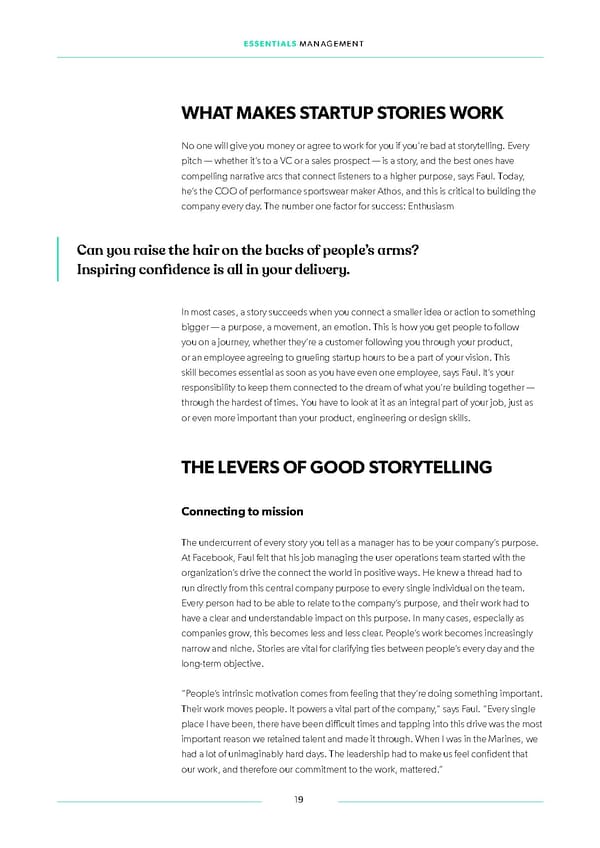ESSENTIALS MANAGEMENT WHAT MAKES STARTUP STORIES WORK No one will give you money or agree to work for you if you’re bad at storytelling. Every pitch — whether it’s to a VC or a sales prospect — is a story, and the best ones have compelling narrative arcs that connect listeners to a higher purpose, says Faul. Today, he’s the COO of performance sportswear maker Athos, and this is critical to building the company every day. The number one factor for success: Enthusiasm Can you raise the hair on the backs of people’s arms? Inspiring conifdence is all in your delivery. In most cases, a story succeeds when you connect a smaller idea or action to something bigger — a purpose, a movement, an emotion. This is how you get people to follow you on a journey, whether they’re a customer following you through your product, or an employee agreeing to grueling startup hours to be a part of your vision. This skill becomes essential as soon as you have even one employee, says Faul. It’s your responsibility to keep them connected to the dream of what you’re building together — through the hardest of times. You have to look at it as an integral part of your job, just as or even more important than your product, engineering or design skills. THE LEVERS OF GOOD STORYTELLING Connecting to mission The undercurrent of every story you tell as a manager has to be your company’s purpose. At Facebook, Faul felt that his job managing the user operations team started with the organization’s drive the connect the world in positive ways. He knew a thread had to run directly from this central company purpose to every single individual on the team. Every person had to be able to relate to the company’s purpose, and their work had to have a clear and understandable impact on this purpose. In many cases, especially as companies grow, this becomes less and less clear. People’s work becomes increasingly narrow and niche. Stories are vital for clarifying ties between people’s every day and the long-term objective. “People’s intrinsic motivation comes from feeling that they’re doing something important. Their work moves people. It powers a vital part of the company,” says Faul. “Every single place I have been, there have been diiffcult times and tapping into this drive was the most important reason we retained talent and made it through. When I was in the Marines, we had a lot of unimaginably hard days. The leadership had to make us feel conifdent that our work, and therefore our commitment to the work, mattered.” 19
 Essentials Management First Round Capital Page 18 Page 20
Essentials Management First Round Capital Page 18 Page 20